Guide to Buying Panama Real Estate
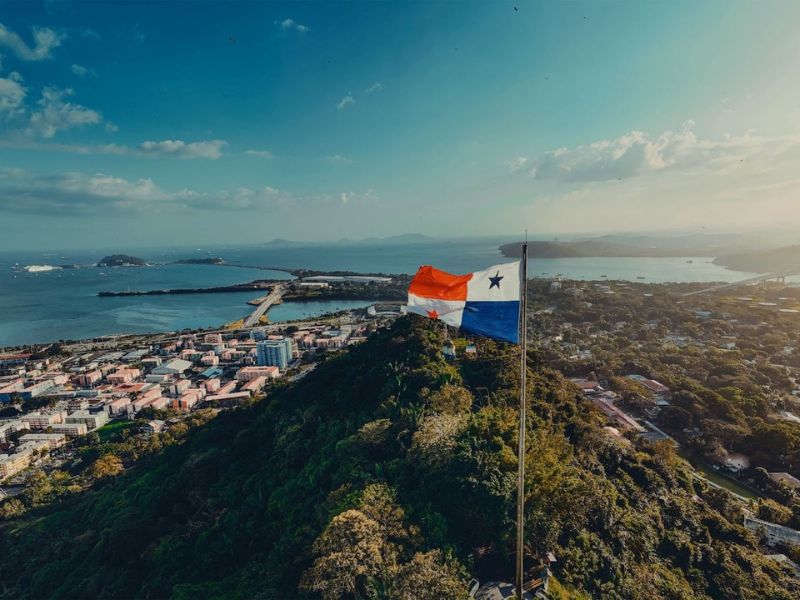
Panama has become one of the most attractive destinations for real estate investment in the Americas. With a strong economy, U.S. dollar currency, political stability, and warm tropical weather, Panama appeals to retirees, investors, and expats alike.
The country’s strategic location, good infrastructure, modern healthcare, and growing expat community add to its popularity. Buying property in Panama is relatively straightforward, especially when compared to other Latin American countries, making it a preferred choice for many North Americans and Europeans.
But Panama’s real appeal lies in its variety.
Nestled at the crossroads of the Americas, Panama is unique for its position connecting the Pacific Ocean with the Caribbean Sea. This vibrant country offers a diverse range of landscapes, including tropical rainforests, pristine beaches, and its cosmopolitan capital, Panama City.
Panama’s real estate investment opportunities are equally diverse, ranging from city condos to beachside homes. So, whether you’re looking for city living in Panama City, a beach lifestyle on the Pacific Riviera, or mountain tranquility in Boquete, you’ll find it here in Panama.
- Guide to Buying Panama Real Estate
- Why Invest in Real Estate In Panama
- Where to Buy Property in Panama
- The Real Estate Buying Process in Panama
- Can Foreigners Buy Property In Panama
- Property Taxes & Fees in Panama
- Financing and Payment Options
- Panama Real Estate: Our Thoughts
- Sign up to Overseas Dream Home now, and Discover The Best Places in the World to Buy Real Estate 2025.
- Sign up to Overseas Dream Home now, and Discover The Best Places in the World to Buy Real Estate 2025.
- Real Estate Opportunities By Country

Reviewed by Ronan McMahon
Ronan McMahon is an Amazon best-selling author and expert in international real estate. He regularly contributes to Overseas Dream Home. Visit his website at ronanmcmahon.com
Why Invest in Real Estate In Panama
Panama offers a compelling case for real estate investment. It combines economic stability, favorable property laws, and lifestyle advantages that appeal to both individual buyers and investors. With a dollarized economy, modern infrastructure, and easy access from North America, Panama has become a leading destination for foreign property ownership.
One of the country’s biggest strengths is its use of the U.S. dollar. This eliminates currency risk for American and Canadian buyers and simplifies banking and transactions. It also adds to Panama’s appeal as a regional financial hub, which helps support long-term property values.
Panama’s property laws allow foreigners to own titled real estate outright, without special permits or residency status. This creates a secure environment for investment. There is also a clear system for title registration, which protects buyer rights and simplifies the transfer of ownership.
Infrastructure is another key advantage. Panama has the most developed road, internet, and utility networks in Central America. Its international airport in Panama City offers direct flights to dozens of cities in North America, Latin America, and Europe. In beach and mountain areas, roads and services continue to improve, opening up new opportunities for buyers.
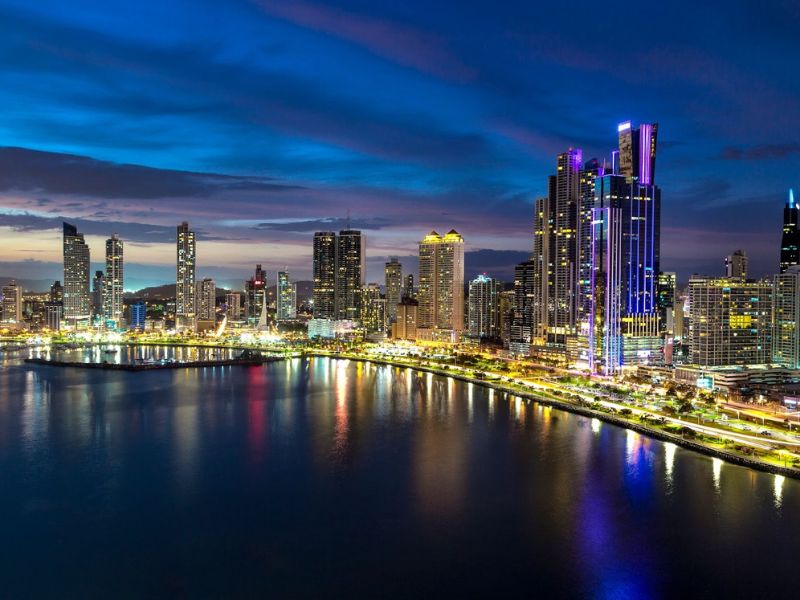
Panama’s capital, Panama City is a true First-World city with modern infrastructure and easy access to North America and Europe.
Rental demand is growing, particularly in areas with large expat populations and tourist traffic. Panama City, Coronado, and Boquete all have strong short-term and long-term rental markets.
Tax incentives add to the appeal. Many new homes qualify for multi-year property tax exemptions, and there is no capital gains tax for certain types of transactions. Combined with low annual property taxes and no restrictions on foreign ownership, the financial setup is buyer-friendly.
With political stability, a strong service sector, and steady tourism and immigration, Panama continues to attract both lifestyle buyers and long-term investors. It’s a market that offers both comfort and opportunity.
Where to Buy Property in Panama
Panama offers a diverse range of real estate markets suited to different lifestyles and budgets. North Americans and other foreigners live throughout Panama, but there are some cities, towns, and regions that draw a larger expat population.
Panama City
Panama City, Central America’s only true First-World capital, is the country’s economic and cultural hub and remains the most popular place for foreign buyers looking for condos, investment properties, and urban living. Panama City stands as a major hub for international commerce and banking, and is home to international non-profits, and giant multi-nationals.
With modern high-rises, hospitals, office buildings, shopping malls, and condo complexes, the “Hub of the Americas” offers all the amenities of a major capital. Neighborhoods like Punta Pacifica, Costa del Este, Avenida Balboa, and El Cangrejo are popular for their amenities, walkability, and real estate investment and rental potential.
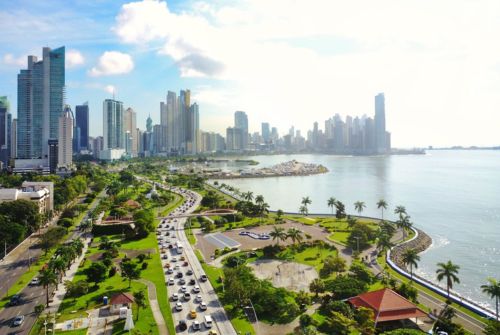
Panama City is a modern city with all the amenities an expat could need for a high-quality life overseas.
Even though prices are higher than elsewhere in the country, Panama City remains an active real estate market and buyers looking for investment income or a central location tend to favor the capital.
Panama City has just about everything you’d expect from a world-class capital; and its cosmopolitan vibes, top healthcare, and close proximity to the U.S. have all helped to transform Panama City into a hub for business and trade into one of the world’s most desirable destinations for buying real estate.
The Pacific Riviera
The Pacific Riviera is the stretch of coast to the west of Panama City and stretches along 50 miles or so of Pacific beaches.
By far the most developed section of coast in all of Panama, and just a 60 to 90-minute drive from Panama City, the area is popular with beach lovers and retirees. It offers a relaxed coastal lifestyle and is one of the most accessible beach markets in the country.
Development began in the 1940s with the establishment of Coronado, the best-known community on this coast. In the decades since, Coronado has developed into a fully serviced expat community with shopping centers, clinics, golf courses, and gated developments.
Other towns and resort destinations on the Pacific Riviera include the beach town of Nueva Gorgona and the prestigious resort community of Buenaventura. And the region has seen massive investment, development and expansion (especially in the last 20 years or so) with hotels, new resorts, a premium golf course, and swish new residential communities popping up all along the Pacific Riviera.
This development on the Pacific Riviera leapfrogged an area known as Chame, which is actually much closer to the capital, for three reasons…
- A lack of road access down Punta Chame peninsula.
- Most of the land was owned by just a few families that didn’t want to sell.
- Much of the land was zoned for agricultural use.
However, in 2015, one of Panama’s foremost developers started work on a massive master-planned project in Punta Chame, along a stretch of beach called Playa Caracol.
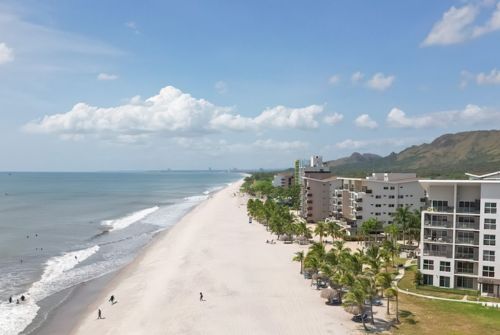
The Pacific Riviera is home to Playa Caraco, set to be a premier beach destination in Panama.
Billions of dollars were invested in new roads, a new bridge over the Panama Canal, new metro lines, and a massive expansion of Tocumen International Airport close to Panama City.
All this made access easier to this once forgotten stretch. And this means that Playa Caracol (and the Pacific Riviera) is destined to become the premier beach destination for real estate investment on this coast.
Boquete
Boquete in the Chiriquí province is one of Panama’s top retirement destinations.
Sitting in the highlands, Boquete has a cooler climate, scenic views, and a well-established expat community. The area is known for its coffee farms, hiking trails, and peaceful lifestyle. Real estate here includes single-family homes, gated communities, and small farms.
Boquete is only 40 minutes from David, Panama’s third largest city with a population of just under 82,000, via a well-paved four-lane road. David is the commercial hub of the region, with shopping, restaurants, and all the services you might need, from government offices to medical providers. Two top-rated private hospitals offer affordable and accessible healthcare to residents of Boquete and all of Chiriquí province.
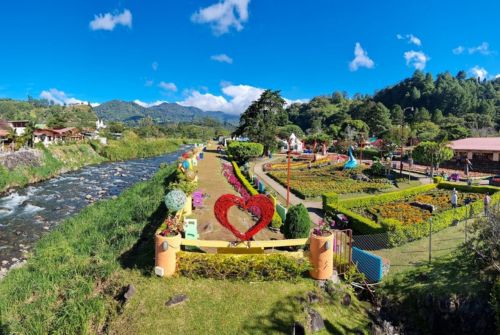
Boquete had long been a favorite destination of expats coming to live in Panama.
With an established expat population, Boquete offers homes with gardens, mountain views, and a quieter pace of life. It’s ideal for those looking to escape the heat and settle into a close-knit community. These markets are more niche but have appeal for adventurous buyers or those seeking unique properties.
Pedasí and the Azuero Peninsula
Located at the tip of the Azuero Peninsula, Pedasí is a quaint beach town with an established expat community that continues to grow as more and more prospective residents discover this treasured jewel.
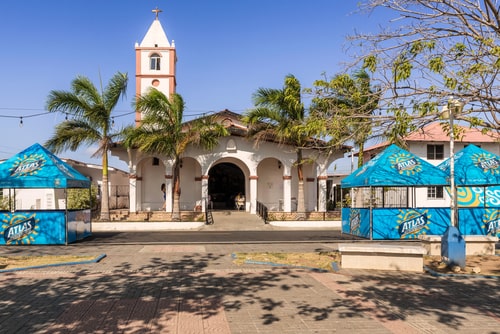
Little Pedasí has a laidback vibe and is only a short drive from the Pacific.
The downtown area of Pedasí is surrounded by green pastures and grazing cattle. While the village center is only a five-minute drive to the Pacific Ocean, and spectacular beaches which are unspoiled by development.
In Pedasí and the Azuero Peninsula, property prices are still relatively low. These areas attract buyers looking for off-the-beaten-path living, with access to surfing beaches and traditional Panamanian culture.
The Real Estate Buying Process in Panama
Panama welcomes foreign property buyers.
The property buying process in Panama is clear and accessible, especially for foreigners who have almost the same rights as Panamanians…with a few exceptions.
Panama allows full ownership of titled property, and buyers have the same rights as Panamanian citizens. Still, it’s important to understand the steps involved and to work with a qualified local attorney throughout the process.
Step 1: Agree on a Price
Panama does not have a Multiple Listing Service, where you can check listings prices by neighborhood, or a website like Zillow that allows you to check recent sold prices.
You should talk with local real estate agents to get an idea of current market values. You can also look at websites such as www.encuentra24.com, where sellers, agents, and developers all list property for sale—it’s a good way to get a ballpark figure on the fair market value for the property you’re buying.
Never go in at full list price. Most of the time, there’s wiggle room in the asking price, so negotiate the best possible price (or have your real estate agent negotiate on your behalf if you’re shy about doing this).
Once a buyer selects a property and negotiates terms with the seller, the first formal step is typically a promise to purchase agreement. This document outlines the agreed price, terms of sale, payment schedule, and any conditions that must be met. A deposit is usually required at this stage, often around 10% of the purchase price.
Step 2: Confirm the Title
The next step involves due diligence.
Your local attorney in Panama can check in the public registry to make sure that the property you’re buying has a good, clean title. The attorney can also verify the size of the property, the boundaries, if there are any liens or mortgages on it, or any restrictions (such as the property being zoned as residential rather than commercial).
Your attorney needs to check that the registered owner is the person selling you the property…it’s a big red flag if they’re not! And, make sure you’re getting titled (also known as fee simple) property, which is the most complete and secure form of ownership.
Once the due diligence checks out, both parties enter into a buy/sell agreement.
Step 3: Enter Into a Promise to Buy/Sell Agreement
Once you’re satisfied your property is titled and free of encumbrances, you can sign a promise to buy/sell agreement, which should lay out the terms and conditions of the sale and set a date for closing/transfer of title.
At this stage it is typical to pay a deposit to the seller. Normally, the agreement calls for a penalty if either party backs out (which means forfeiting your deposit—so ask that the seller faces an equal penalty if they back out). At closing, both parties should sign a final buy/sell contract.
Step 4: Transfer the Title
For the final buy/sell contract, your attorney should conduct an additional search to ensure that no liens or mortgages have been filed since they first researched the property. The contract in final form is then drawn up as a public deed, and all parties must sign in the presence of a notary.
Step 5: Transfer the Funds
The top tip here is never pay the seller directly. There is an easy, established, and safe way to pay in Panama. It’s called an irrevocable letter of payment. You pay the funds to a local bank in Panama, and they issue a letter to the seller telling them they have the money and will release it when certain terms and conditions are met (such as transferring title and any mortgages or loans on the property being paid off). Your attorney can help you to set this up.
Property purchases must be made in U.S. dollars, which eliminates currency conversion risks and makes transactions easier for North American buyers. Foreigners do not need residency status to buy property, and there are no restrictions on how many properties you can own.
Step 6: Record Your Purchase at the Public Registry
This can be done in as little as 10 days if your attorney files the documents in Panama City. It can also be done even more quickly, using a next-day service, if you pay an additional fee (and provided all your documents are in order).
Once the registration process is complete, your attorney will give you the registered title deed. Finally, have a copy of the deed filed with the tax records department: this is a vital step, as only then is the property transfer complete and the property truly yours.
Although Panama’s property laws are favorable, paperwork and timelines can vary. Some transactions close in as little as 30 days, while others may take longer due to registry delays or financing issues. It’s important to have local representation to handle documentation and guide you through the process.
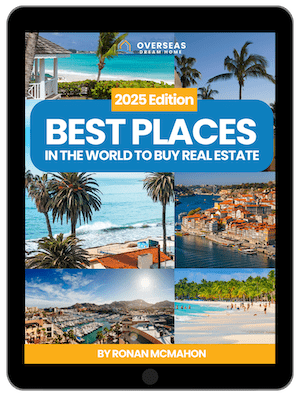
Sign up to Overseas Dream Home now, and Discover The Best Places in the World to Buy Real Estate 2025.
Enter your email now to download The Best Places in the World to Buy Real Estate in 2025.
You’ll also start receiving your free Overseas Dream Home eletter in your inbox every day!
No-spam pledge: We value your privacy. You can unsubscribe at any time.
Can Foreigners Buy Property In Panama
There are some restrictions on foreign ownership of waterfront and island property. And, untitled land must be owned by a citizen of Panama for a minimum of two years before it can be sold on to a foreign buyer. After the two-year period, the land can be titled and resold without restriction. (Note: Some untitled land can never be titled, so get professional advice before you decide to buy.)
Under Article 286 of the constitution, foreign ownership of property within 10 kilometers (6.2 miles) of an international border is forbidden. Panama borders Colombia and Costa Rica. You’ll see lots of property advertised (often by fellow foreigners) in these exclusion zones, in places like Puerto Armuelles, so do your homework and find out if you can legally own what you’re planning to buy.
Then, there are some issues that apply equally to foreigners and locals alike.
By law, all beachfront properties must provide a public right of way starting from the highest tide to the property line, so the public can walk along the beach.
Permits to build over the water or for a marina can take a long time, a lot of red tape, and a lot of money to get.
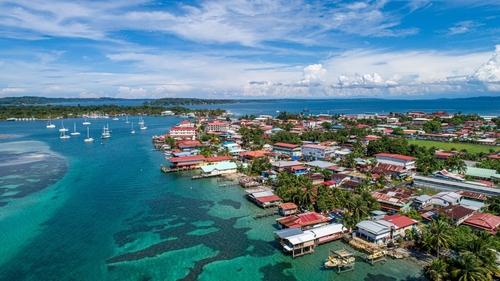
Foreigners can property outright in Panama, but you need to be aware of restrictions around buying near beaches and in certain parts of the country, like Bocas del Toro.
There are special regulations when dealing with beachfront property you must be aware of.
Getting clear title to property in some parts of Panama can be tricky, too. A good portion of the country lies in comarcas (indigenous reserves), which are independent, sovereign states. Don’t even try to buy property in these zones.
In areas like Bocas del Toro, much of the land is not titled. It’s derecho posesorio, possession rights…and many foreign buyers who have purchased this type of property have come unstuck, losing the property and the money they paid for it. Our advice: stick to titled/fee simple property.h transaction and avoid unexpected financial surprises when purchasing property in Portugal.
Property Taxes & Fees in Panama
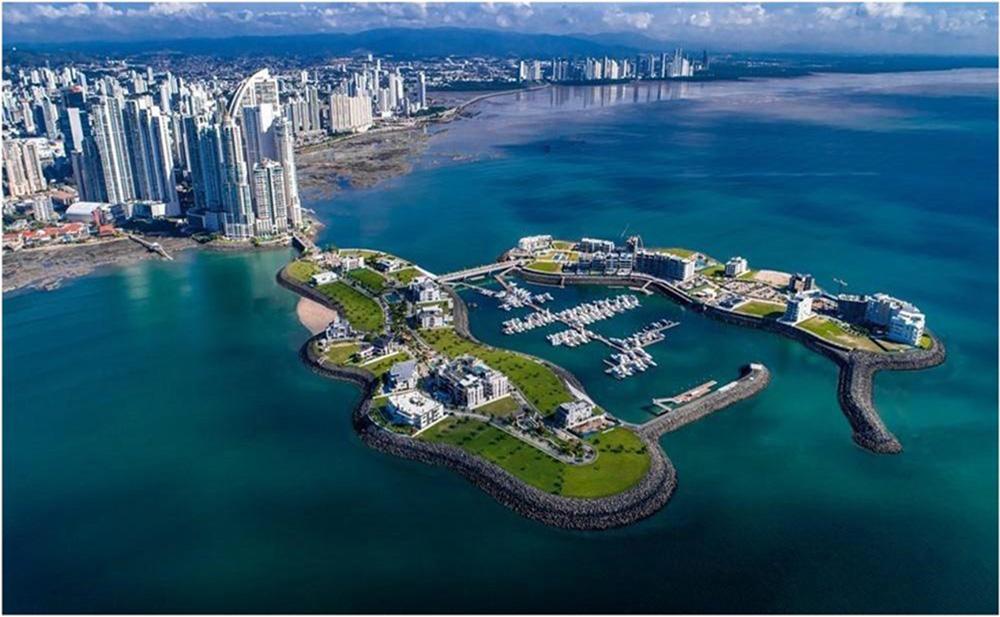
Buying property in Panama involves several costs beyond the purchase price, but they are generally lower than what buyers might expect in other international markets. Understanding these fees upfront can help you budget accurately and avoid surprises.
Panama’s property tax rates are among the lowest in the region. Family/primary residences pay 0.5% to 0.7%, unless the property is valued at $120,000 or less, in which case the property is tax free.
For all others (such as vacant lots, commercial property, and vacation homes) the rates are 0.6% to 1%, unless valued at $30,000 or less, in which case the property is tax free.
Transfer Tax
Real estate transfer taxes in Panama are paid by the seller and are 2% of either the updated registered value of the property or the sale price—whichever is higher. If a property is bought by a corporation, it is customary for the shares of the company to be sold (instead of the property), thus eliminating the need to pay transfer tax.
Capital Gains Tax
Capital gains tax in Panama is a flat 10% of gross sale profit, provided you do not buy and sell real estate for a living. However, the seller may choose to pay 3% of the sale price upfront or, according to current legislation, if paying 10% over the actual capital gains is more favorable, may choose to pay 10% as the final capital gains tax by submitting an affidavit to the tax department and supporting documents prior to the signing of the title deed. If you sell more than one property a year, any profits must be included in your Panamanian tax return. In this case you would pay income tax on these profits but no additional capital gains tax.
Financing Your Property Purchase
As with many other countries around the world, it is difficult for foreigners to obtain loans in Panama, including mortgages to purchase real estate. Simply put, you don’t have a credit history in the country, and banks are very strict. Foreign residents with a temporary or permanent residence visa have better luck, but it’s still not an easy process and the terms are often unattractive.
With certain purchases, there may be alternative forms of financing available. In preconstruction projects, for instance, the developer may offer financing.
Real Estate Agents and Their Fees
Real estate agents in Panama must be licensed by law, so check that the agent you are using has a valid, active license. The typical agent fee in Panama for a property sale/purchase is 5%. This is paid by the seller.
There is no real concept of a buyer’s agent in Panama. If you ask a real estate agent to show you some listings, they will usually first show you their own listings…and then perhaps listings from other agents (where your agent will split the 5% fee with the listing agent).
Escrow and Title Insurance
There are no escrow services in Panama, but there is a good alternative—the irrevocable letter of payment outlined in Step 5 above. Title insurance is also not available in Panama, so you really need to get a good attorney on board to ensure the title of the property you buy is good and clean.
Financing and Payment Options
Most property purchases in Panama are completed in cash, particularly by foreign buyers. The process is faster and simpler when buyers pay outright, and sellers tend to prefer cash transactions due to fewer complications. That said, financing is available through local banks, but it can be more difficult for non-residents to qualify.
Panamanian banks do offer mortgage loans to foreigners, but requirements are strict. Buyers generally need to provide proof of income, bank statements, credit history, and a significant down payment—often 30% to 40% of the purchase price. Loan terms usually range from 15 to 25 years, and interest rates typically fall between 5% and 7%. These rates are higher than in North America, and the paperwork can be time-consuming.
Foreigners who plan to live in Panama full time or already have legal residency may have better access to financing. Some banks are more flexible with permanent residents or those with local income.
Another option is seller financing. This can be more accessible and is increasingly common in pre-construction developments or private sales. In these arrangements, the buyer makes an initial deposit and then pays the balance in installments, typically over one to five years. Interest rates and terms are negotiable, making this a good alternative for buyers who do not want to deal with local banks.
All real estate transactions are conducted in U.S. dollars. This makes financial planning easier for North American buyers and eliminates currency conversion risks. It also simplifies international transfers, which are commonly made to Panamanian escrow accounts managed by law firms or title companies.
Cash remains the most efficient way to buy, and buyers should work with professionals to ensure secure transfers and proper documentation.
Whether you’re purchasing a home for personal use, as a vacation property, or for rental income, owning real estate in Portugal can be a rewarding and financially sound investment.

Sign up to Overseas Dream Home now, and Discover The Best Places in the World to Buy Real Estate 2025.
Enter your email now to download The Best Places in the World to Buy Real Estate in 2025.
You’ll also start receiving your free Overseas Dream Home eletter in your inbox every day!
No-spam pledge: We value your privacy. You can unsubscribe at any time.
Panama Real Estate:
Our Thoughts
Panama stands out as one of the most reliable and appealing real estate markets in Latin America. With full property rights for foreigners, low taxes, and a dollar-based economy, it offers a secure environment for both lifestyle buyers and investors. Whether you’re looking for a city condo, a beach retreat, or a quiet home in the mountains, Panama delivers a range of options to fit your budget and goals.
The buying process is straightforward with the right legal support, and costs remain competitive by international standards. From modern city living in Panama City to the cooler highlands of Boquete and the beach communities of the Pacific Coast, the country provides something for every buyer type.
Panama’s strong infrastructure, growing expat population, and welcoming investment climate continue to make it one of the top choices for overseas property buyers. With careful planning and local guidance, purchasing real estate here can be both rewarding and financially sound.